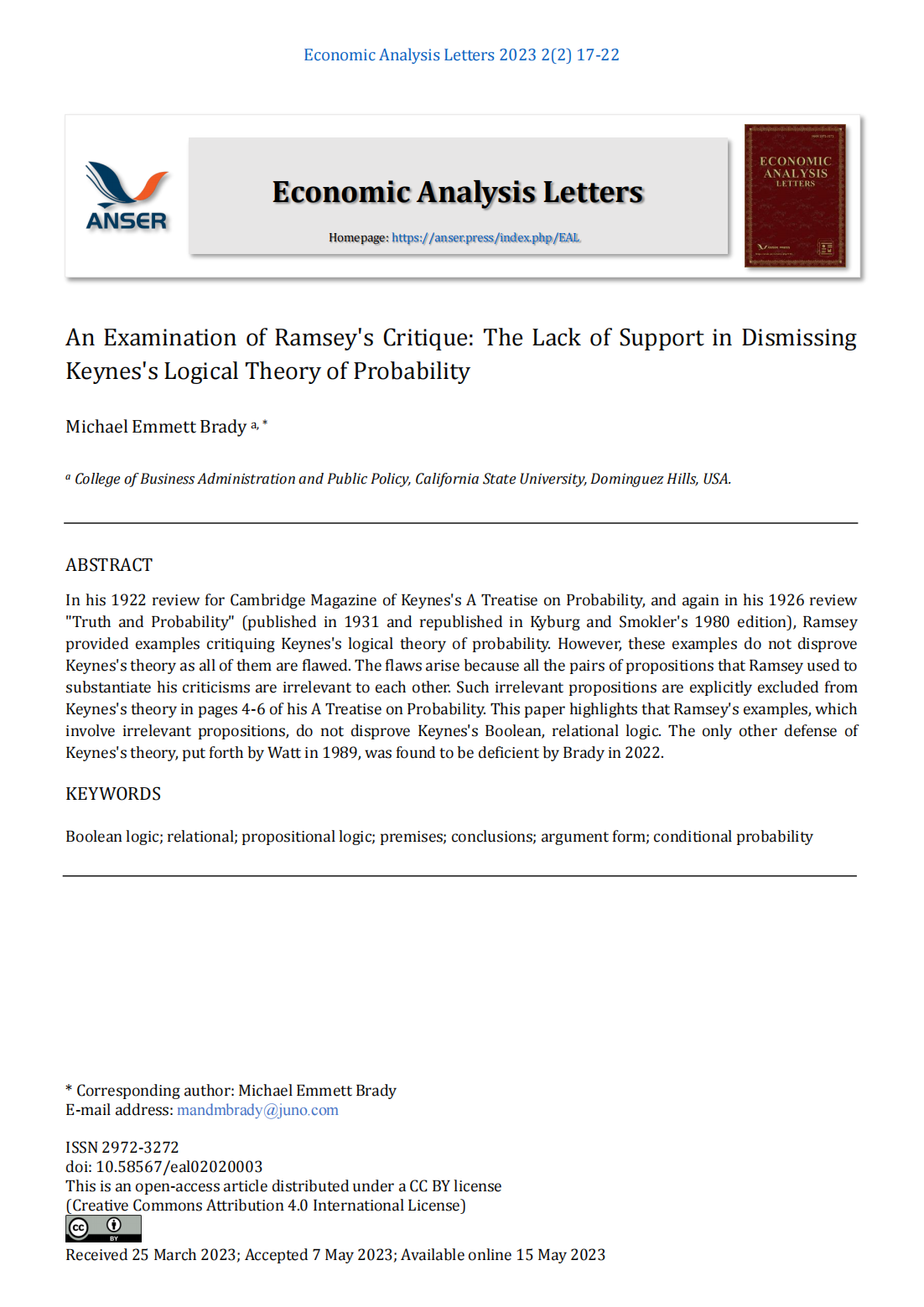An Examination of Ramsey's Critique: The Lack of Support in Dismissing Keynes's Logical Theory of Probability
DOI:
https://doi.org/10.58567/eal02020003Keywords:
Boolean logic; relational; propositional logic; premises; conclusions; argument form; conditional probabilityAbstract
In his 1922 review for Cambridge Magazine of Keynes's A Treatise on Probability, and again in his 1926 review "Truth and Probability" (published in 1931 and republished in Kyburg and Smokler's 1980 edition), Ramsey provided examples critiquing Keynes's logical theory of probability. However, these examples do not disprove Keynes's theory as all of them are flawed. The flaws arise because all the pairs of propositions that Ramsey used to substantiate his criticisms are irrelevant to each other. Such irrelevant propositions are explicitly excluded from Keynes's theory in pages 4-6 of his A Treatise on Probability. This paper highlights that Ramsey's examples, which involve irrelevant propositions, do not disprove Keynes's Boolean, relational logic. The only other defense of Keynes's theory, put forth by Watt in 1989, was found to be deficient by Brady in 2022.
References
Boole, George. (1854). The Laws of Thought. New York; London.
Brady, Michael Emmett. (2004a). J. M. Keynes’ Theory of Decision Making, Induction, and Analogy: The Role of Interval Valued Probability in His Approach. Xlibris Corporation; Philadelphia, Pennsylvania.
Brady, Michael Emmett. (2022a). No where in J M Keynes’s A Treatise on Probability (1921) did Keynes ever state that “…between any two non-self-contradictory propositions there holds a probability relation (Axiom I)…”(Ramsey,1922,p.3;1989,p.219). Journal of Insurance and Financial Management, Vol.6, No.1, pp.89-102. https://journal-of-insurance-and-financial-management.com/
Brady, Michael Emmett. (2022b). On the Need for Insurance Analysts and Actuaries to reconsider Keynes’s Logical Theory of Probability, Part I: Russell’s Refutation of Ramsey’s Critique of Keynes’s Theory in 1922. Journal of Insurance and Financial Management, Vol.6, No.4, pp.89-94. https://journal-of-insurance-and-financial-management.com/
Brady, Michael Emmett. (2022c). On the Need for Insurance Analysts and Actuaries to reconsider Keynes’s Logical Theory, Part II: On Ramsey’s Refusal to Recognize Russell’s Refutation of Ramsey. Journal of Insurance and Financial Management, Vol.6, No.5, pp.1-8. https://journal-of-insurance-and-financial-management.com/
Brady, Michael Emmett. (2022d). D. E. Watt’s reply for Keynes to Ramsey in the British Journal for the Philosophy of Science in 1989 is defective. Theoretical and Practical Research in the Economic Fields, Volume XIII, Issue 2(26), (Winter), pp.109-115. https://doi.org/10.14505/tpref.v13.2(26).01
Franklin, James. (2001). Resurrecting logical probability. Erkenntnis, 55, pp. 277–305. https://doi.org/10.1023/A:1012918016159
Gerrard, Bill. (2023). Ramsey and Keynes revisited. Cambridge Journal of Economics, Vol.47, No.1, (January), pp.195-213. https://doi.org/10.1093/cje/beac068
Gillies, D. (1972). The Subjective Theory of Probability. The British Journal for the Philosophy of Science, (May), Vol. 23, No. 2, pp. 138-157. 10.1093/bjps/23.2.138
Keynes, J. M. (1936). The General Theory of Employment, Interest, and Money. Prometheus Books (1997); Amherst, New York.
Keynes, J. M. (1973). A Treatise on Probability. Macmillan, London. Volume 8. CWJMK edition of the A Treatise on Probability (with the editorial foreword of R. B. Braithwaite, pp. xiv-xxii).
Keynes, J.M. (1921). A Treatise on Probability. Macmillan, London, 1921.
Kyburg, H. E. (1974). The Logical Foundations of Statistical Inference, Reidel, Dordrecht.
Kyburg, H. E. Jr., & Smokler, H. E. (eds.). (1980). Introduction. In Kyburg and Smokler, Studies in Subjective Probability. New York: Wiley (2nd ed.), pp.25-52.
Levi, I. (1974). On Indeterminate Probabilities. Journal of Philosophy, 71, pp. 391–418. 10.2307/2025161
Misak, C. (2020). Frank Ramsey: A sheer excess of powers. United Kingdom; Oxford University Press.
Misak, C., Naylor, C. D., Tonelli, M., et al. (2022). Case Report: What—or Who—Killed Frank Ramsey? Reflections on Cause of Death and the Nature of Medical Reasoning. Wellcome Open Research, 7:158. [Version 1; Peer Review: 1 Approved] https://doi.org/10.12688/wellcomeopenres.17759.1
Pan, Y., & Yuan, B. (1997). Bayesian Inference of Fuzzy Probabilities. International Journal of General Systems, 26, pp. 73–90. https://doi.org/10.1080/03081079708945170
Ramsey, F. P. (1922). Mr. Keynes on Probability. Cambridge Magazine, XI, 1, pp. 3-5. Reprinted in the British Journal of the Philosophy of Science, 40, (1989), pp. 219-222. https://doi.org/10.1093/bjps/40.2.219
Ramsey, F. P. (1926). Truth and Probability. In D. H. Mellor (Ed.), Philosophical Papers. Cambridge University Press, (1990), pp. 52–94.
Russell, B. (1922). Review of A Treatise on Probability by John Maynard Keynes. Mathematical Gazette, 11, pp. 119-125. https://doi.org/10.2307/3609931
Sahlin, N.-E. (1990). The Philosophy of F.P. Ramsey. Cambridge University Press. Retrieved from https://www.nilsericsahlin.net/the-philosophy-of-f-p-ramsey
Spiegelhalter, D. J., Dawid, A. P., Lauritzen, S. L., & Cowell, R. G. (1993). Bayesian Analysis in Expert Systems. Statistical Science, 8, pp. 219–283. https://www.jstor.org/stable/2245959
Walley, P. (1991). Statistical Reasoning with Imprecise Probabilities. London: Chapman and Hall.

Downloads
Published
How to Cite
Issue
Section
License
Copyright (c) 2023 Michael Emmett Brady

This work is licensed under a Creative Commons Attribution 4.0 International License.